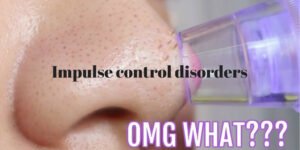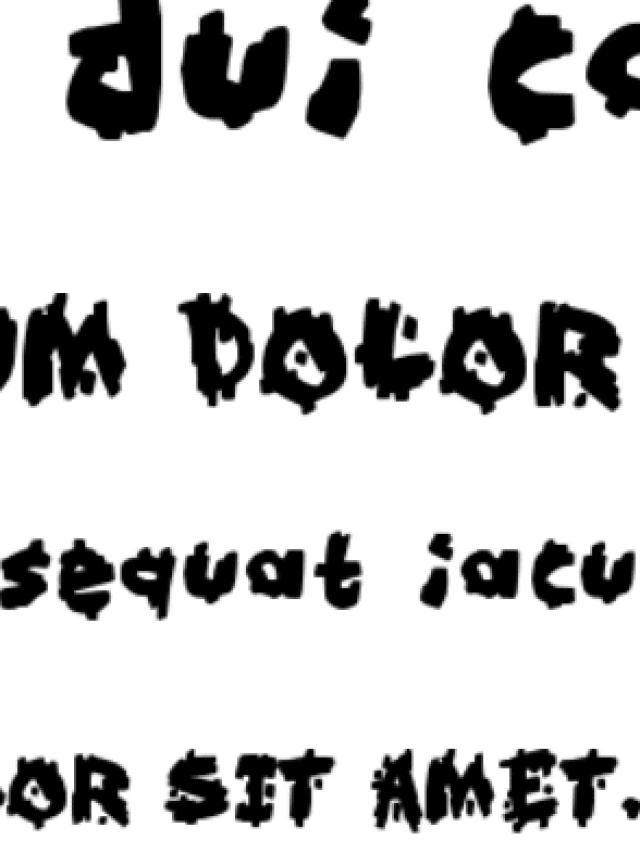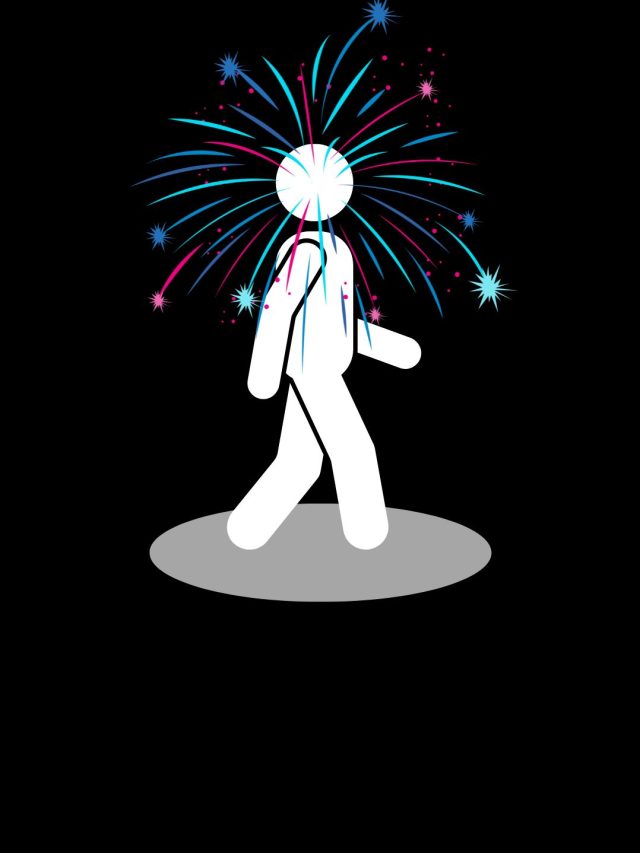Humans like to think they are in control. This includes the ability to control impulses and urges. But, some people have difficulty controlling their impulses and can’t resist the urge to do something harmful. These people are said to suffer from a psychological disorder known as Impulse control disorder.
Impulse[1] control disorders (ICDs) are common psychiatric conditions characterized by urges and behaviors that are excessive and harmful to oneself (or others). The affected individuals typically report significant impairment in social and occupational functioning. There are legal and financial difficulties as well depending on the nature of ICD.
Some popular ICD’s[2] include addictions to alcohol or drugs, eating disorders, compulsive gambling, paraphilias (abnormal sexual behaviors), trichotillomania (compulsive hair pulling), kleptomania (compulsive stealing), pyromania (repeated fire setting), and intermittent explosive disorder (failure to resist aggressive impulses resulting in violence).
Basic characteristics of ICD’s include repetitive or compulsive engagement in a specific behavior despite adverse consequences. There is diminished control over the problematic behavior and tension or an appetitive urge state before acting on it (a behavior). Individuals with ICD’s engage in repetitive[3] behaviors; often with strong urges underlying them. And, behaviors are often considered pleasurable or egosyntonic (behaviors, values, and feelings that are in harmony with one’s self-image).
Individuals with ICDs typically score high on measures of impulsivity and related constructs like sensation-seeking. Impulsivity can be defined as a predisposition to rapid, unplanned reactions to internal or external stimuli without regard to the negative consequences of these reactions to the impulsive individual or to others. It lies at the core of these disorders.
Critical defining criteria[4] for these disorders include:
- The failure to resist an impulse to perform some act that is harmful to the individual or others
- An increasing sense of arousal or tension before committing or engaging in the act
- Experience of either pleasure, gratification, or release of tension at the time of committing the act
- A hedonic quality during the performance of the problematic behavior
Some physiological and cognitive[5] symptoms include tingling sensation, palpitations or increasing pressure within head or chest, sudden exhaustion after an episode, emotional stress, alcohol abuse and traumatic injuries or accidents and obsessive and compulsive thought patterns, inability to control impulses and remain patient respectively. Explosive[6] outbursts of violent emotions occur as a defense against narcissistic injurious events. Typical patients have been described as physically robust but having a poor sense of identity. This is usually seen in men with physically large bodies but are dependent along with weak masculine identity.
Recap: Impulse control disorders are characterized by difficulties in resisting the urge and temptation (or an overwhelming drive) to do something which is harmful.
Impulse Control disorders: Types & characteristics
Here are a few common ICDs[7]:
Pathological gambling:
An impulse control disorder that is characterized by recurrent and maladaptive patterns[8] of gambling behavior that significantly disrupts the patient’s functioning in the personal, familial, or vocational spheres. This disorder usually starts during adolescence and is more common in men than in women. Comorbidity (additional diagnoses) is seen in pathological gamblers as they score high on measures of depression and have incidences of various psychiatric disorders including bipolar, anxiety and substance use disorders.
Trichotillomania
Patients affected with trichotillomania (TTM) have an overwhelming urge to pluck out specific hair, and when they do so, their anxiety is momentarily relieved. But, this is quickly replaced by another urge to pluck, and even higher anxiety is experienced. These patients recognize their behavior as senseless, undesirable and also that they are performing it in response to anxiety.
Pyromania
In pyromania, there is impulsive, repetitive, deliberate firesetting without external reward. Epidemiological studies have concluded that adolescent boys may be at a higher risk for fire setting than adolescent girls. Temperament, parental psychopathology, social and environmental factors, and possible neurochemical predispositions have been hypothesized to cause childhood pyromania. A close link is observed between firesetting and aggression, anti-social behavior, shyness, and peer-rejection.
Intermittent explosive disorder
IED is characterized by recurrent episodes of aggressive behavior that is out of proportion to psychosocial stressors. Clinical surveys of psychiatric inpatients and clinical treatment studies on IED have found low rates of IED in psychiatry settings. Investigations have reported low rates of IED in patients with OCD.
Kleptomania
Kleptomania is a disorder in which the individual impulsively steals even though there is no need to do so. Like other ICD’s, kleptomania too is characterized by an anxiety-driven urge to perform a specific act that is pleasurable at the moment but causes significant distress and dysfunction. Kleptomaniac behavior carries serious legal consequences: approximately 2 million Americans are charged with shoplifting annually. An economy incurs severe losses due to kleptomaniacs.
Internet usage disorder also referred to as internet addiction or problematic internet use is the uncontrollable and damaging use of the internet and has only recently begun to appear in the psychiatric literature. People with problematic Internet use often report increasing amounts of time-spent web surfing, gambling, shopping or exploring pornographic sites. This also includes excessive chatting and use of email. People with this disorder experience increased irritability when trying to cut their Internet use as they are preoccupied with the net and hence tend to escape internet avoidance. Research has shown an increased rate of this disorder among women.
Paraphilias & fetishism
Paraphilias involve unconventional sexual behaviors which may or may not be extreme and dangerous. However, they are often dysfunctional as gratification with these behaviours involve distressing others or legal penalties. (e.g., exhibitionism, voyeurism). Male patients have been traditionally reported to be more afflicted than women although it is not clear how large this sex difference is as men approach professionals with greater frequency.
Compulsive buying
This one is characterized by maladaptive preoccupations or impulses to buy or shop. The shopping impulse is often irresistible, intrusive, and senseless. It is accompanied by frequent episodes of purchasing items that are not needed or that cost more than can be afforded. These patients experience distress and significant impairment in social and occupational performance. The onset of compulsive buying occurs in the late teens, and the disorder is generally chronic as these patients engage in this behavior for longer periods of time than intended. Lower rates of compulsive buying have been found in patients with OCD.
In short, ICD’s result in distress, dysfunction, disfigurement. They are also associated with lowered self-worth. Marital or family strife is a common complication that permeates an ICD patient’s life. He/she could experience extreme difficulty in developing and maintaining healthy interpersonal relationships. Job loss or reduced productivity, legal difficulties, or school failure could also be other problems a sufferer has to tackle.
This clinical picture is not the end.
Modern impulsive phenomenon
Impulse control disorders are manifest with certain impulses. These impulses could be seemingly random. Such as popping blackheads (blackened pores on the face filled with dirt, dead skin, bacteria). The word ‘Blackhead removal’ is searched on google[9] 11 times more often today than it was searched 10 years ago. In fact, in the US, it’s 24 times more! This may be a direct association with people becoming aware of blackheads as a problem and having the impulse to remove them. The problem doesn’t end there. The impulse of removing leads to inappropriate removal tactics that often infect the skin and cause other problems. This further aggravates and causes second-order skin problems – a downhill slope.

Snap chatting (and photo sharing) every moment of the day may be another impulse based on a relatively modern phenomenon of using Snapchat. It is a private photo sharing app which lets you add quirky effects and send it to your buddies. The impulse to share a photo isn’t the problem. The impulse to share every aspect of life as a photo could be. The impulse increases preoccupation with such apps, ultimately, wasting time. As with all ICDs, there is a problem in controlling an impulse. Imagine losing out on the actual experience of something because you were preoccupied snapping it? Use it for fun.
It is not an unlikely scenario where modern-day changes in lifestyle generate newer impulses based on anxiety associated with some other aspect. It’s hard to predict what else could become an ICD. Those of you who have read and understood this article so far, be careful and don’t fall in the trap of having an impulse so strong that you can’t control it and thus act on it in unhealthy ways.
Causes of Impulse Control Disorders
Multiple factors such as physical, environmental and genetic factors come into play when leading up to the onset of impulse control disorders.
Psychosocial[10] factors that are connected with impulse control disorders are usually related to early-life events. Improper models for identification, such as parents who have difficulty controlling their own impulses will cause a child to imitate their behavior. Other psychosocial factors include exposure to violence at home, alcohol abuse, promiscuity and anti-social behavior.
Research has proven that impulsive and violent activity is associated with specific brain regions, such as the limbic system. On the other hand, other brain regions control the inhibition of such behaviors.
Various hormones contribute to addictive behaviors. Dopaminergic[11] systems are implicated in impulsivity and ICDs. Aminobutyric[12] acid is the main inhibitory neurotransmitter (neurotransmitters that decrease the rate of the neuron’s firing) in the brain. It is synthesized in nerve terminals from glutamate by the enzyme glutamate decarboxylase. Glutamate, an excitatory neurotransmitter (neurotransmitters that increase the rate of a neuron firing) and precursor of GABA is also implicated in addictions as well as ICDs.
The following psychosocial[13] factors lead to violent outbursts:
- A sense of being useless and impotent or being unable to change the environment or situation of the individual concerned
- High levels of anxiety, guilt, and depression: Often associated with unfavorable childhood environments like exposure to alcohol dependence, beatings and life threats, and abusive parents
- Predisposing factors in infancy and childhood: perinatal trauma, infantile seizures, head trauma, encephalitis, minimal brain dysfunction, and hyperactivity
- Early frustration, oppression and hostility, and situations that are reminiscent of these conditions
Biological factors also play a role in the formations of Impulse control disorders. Here are a few contributing factors:
- Brain physiology disorders particularly in the limbic system
- Impaired or dysfunctional serotonergic transmission: consequently decreases the effect of punishment as a deterrent to behavior
- High levels of testosterone
- Biological relatives of patients with the disorder are more likely to have histories of temper or explosive outbursts than the general population. First degree relatives are more prone to develop this condition.
Comorbidity is defined as the co-occurrence of two or more disorders in the same individual at the same point in time. It is an important factor that has to be taken into consideration in the presence of ICD’s. Several studies have consistently reported that patients with pathological gambling suffer from high rates of lifetime mood disorders, anxiety disorders, and substance abuse disorders. Elevated rates of compulsive buying, compulsive sexual behavior, and intermittent explosive disorder have also been found.
High rates of other psychiatric disorders have been found in patients with kleptomania. In particular, high rates of mood and substance use disorders have been found in kleptomaniacs. Patients with compulsive buying commonly experience comorbid disorders that include a lifetime of anxiety, substance abuse, eating and impulse control disorders. More than one-fourth[14] of ICD patients had 2 or more ICDs, which is consistent with previous case reporting that comorbid ICDs commonly occur in patients with Parkinson Disease (PD). This highlights the importance of inquiring about multiple ICDs when assessing patients with PD.
Impulse control disorders are common among psychiatric inpatients with a broad range of disorders, including anxiety disorders and psychotic disorders. Research suggests that compulsive buying is the most common and current lifetime impulse control disorder and trichotillomania the least common. Treatment of either an impulse control disorder or another psychiatric disorder could be complicated or compromised by the presence of the other untreated condition. Treating one disorder alone may not be effective if a co-occurring disorder exists. Commonly co-occurring disorders are bipolar disorders, anxiety disorders, depressive disorders, post-traumatic stress disorder, oppositional defiant disorder, conduct disorder and anti-social personality disorder.
As per the current state of affairs in clinical research, ICDs and OCD seem to overlap quite a bit but have a few solid differentiating factors. You can read this paper[15] to understand their relationship.
Treatment for Impulse control disorders
ICD’s can be treated[16] through pharmacotherapy and psychotherapy. Increasing research suggests that, while the efficacy of various treatments has been investigated for certain disorders, systematic research of clinical treatment still lacks for other disorders. Comorbidity is a crucial issue that has to be taken into consideration when considering pharmacotherapy for patients with ICD’s as other disorders may be present which require a differnt way of treatment.
Pathological gambling is a good example of the importance of comorbidity in determining treatment. Selective serotonin reuptake inhibitors (SSRI), commonly known as antidepressants, mood stabilizers and opioid antagonists (a drug that acts on opioid receptors) have been used to treat this disorder. Due to the presence of bipolar spectrum comorbidity in some gamblers, treatment with antidepressants needs to be carefully evaluated and excluded to avoid the possible reemergence of manic symptoms. Patients with other addictive disorders and intense urges and craving might particularly benefit from opioid antagonists.
Pharmacological treatment of TTM is not well established, and although studies have given mixed results, SSR’s seem to show the best efficacy and safety. Another therapy that has a dramatic effect in reducing symptoms of TTM is cognitive behavioral therapy. Non-pharmacological interventions including CBT, short-term counseling and day treatment programs have shown some efficacy in treating patients with pyromania.
Treatment options for IED include the use of mood stabilizers, phenytoin, SSRIs, blockers, agonists, and antipsychotics. Reduced scores on measures of irritability and aggression are seen in patients treated with SSRIs. CBT, group therapy, family therapy, and social skill training have proved to be valid treatments for aggressive patients.
SSRI seems to be the most promising treatment for kleptomania, either as monotherapy or in combination with other psychotropic drugs.
Behavioral therapy techniques have been used to limit the amount of time on the Internet. Self-help groups are being formed to help this problem.
Different forms of psychotherapy have been shown to be effective for paraphilias sexual behavior.
Antidepressants in combination with mood stabilizers effectively treat patients with compulsive buying disorder.
According to the American Journal of Psychiatry, impulse control disorders are relatively common. They carry substantial morbidity and mortality and may be treated effectively with behavioral and pharmacological therapies.
Numerous studies have confirmed that the conceptualization of ICD’s as obsessive-compulsive related disorders is still valid. Also, there is evidence supporting the relationship between ICD’s and addictive as well as affective disorders.
Understanding and treating ICDs can improve life. If you feel you have a problem. Visit a professional and tackle it head-on.
Further reading:
- https://psychcentral.com/lib/what-are-impulse-control-disorders/[17]
- https://ajp.psychiatryonline.org/doi/abs/10.1176/appi.ajp.162.11.2184[18]
- https://jamanetwork.com/journals/jamaneurology/fullarticle/800232[19]
- https://link.springer.com/article/10.1007/s00406-006-0668-0[20]
- http://www.ietherapy.com/impulse-control-disorder/causes/impulse-control-disorder-causes.php[21]
P.S. I like Snapchat
Primary Author: Toshavi Dalvi, our newest member.
Sources
[2]: https://psychcentral.com/lib/what-are-impulse-control-disorders/
[3]: https://www.sciencedirect.com/science/article/pii/S0006295207004236
[4]: https://link.springer.com/article/10.1007/s00406-006-0668-0
[5]: http://www.resourcetreatmentcenter.com/behavioral/impulse-control/symptoms-effects
[6]: http://www.ietherapy.com/impulse-control-disorder/causes/impulse-control-disorder-causes.php
[7]: https://link.springer.com/article/10.1007/s00406-006-0668-0
[8]: https://link.springer.com/article/10.1007/s00406-006-0668-0
[9]: https://trends.google.com/trends/explore?date=all&q=blackhead%20removal
[10]: http://www.ietherapy.com/impulse-control-disorder/causes/impulse-control-disorder-causes.php
[11]: https://www.sciencedirect.com/science/article/pii/S0006295207004236
[12]: https://www.ncbi.nlm.nih.gov/pmc/articles/pmc2222549/
[13]: http://www.ietherapy.com/impulse-control-disorder/causes/impulse-control-disorder-causes.php
[14]: https://jamanetwork.com/journals/jamaneurology/fullarticle/791794
[15]: https://www.ncbi.nlm.nih.gov/pmc/articles/PMC2792582/
[16]: https://link.springer.com/article/10.1007/s00406-006-0668-0
[17]: https://psychcentral.com/lib/what-are-impulse-control-disorders/
[18]: https://ajp.psychiatryonline.org/doi/abs/10.1176/appi.ajp.162.11.2184
[19]: https://jamanetwork.com/journals/jamaneurology/fullarticle/800232
[20]: https://link.springer.com/article/10.1007/s00406-006-0668-0
[21]: http://www.ietherapy.com/impulse-control-disorder/causes/impulse-control-disorder-causes.php

Hey! Thank you for reading; hope you enjoyed the article. I run Cognition Today to capture some of the most fascinating mechanisms that guide our lives. My content here is referenced and featured in NY Times, Forbes, CNET, and Entrepreneur, and many other books & research papers.
I’m am a psychology SME consultant in EdTech with a focus on AI cognition and Behavioral Engineering. I’m affiliated to myelin, an EdTech company in India as well.
I’ve studied at NIMHANS Bangalore (positive psychology), Savitribai Phule Pune University (clinical psychology), Fergusson College (BA psych), and affiliated with IIM Ahmedabad (marketing psychology). I’m currently studying Korean at Seoul National University.
I’m based in Pune, India but living in Seoul, S. Korea. Love Sci-fi, horror media; Love rock, metal, synthwave, and K-pop music; can’t whistle; can play 2 guitars at a time.



























